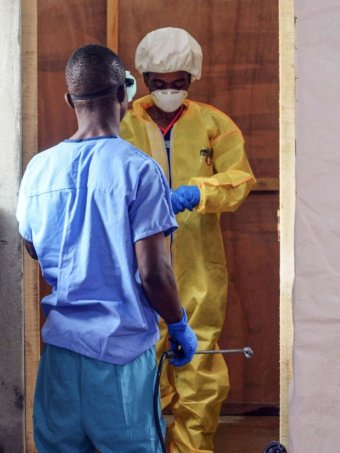Guinea and Sierra Leone have reported 35 new Ebola cases in the past week, four times as many as the week before, in a reminder that the virus “will not go quietly”, a top World Health Organisation official says.
“It will take an extraordinary effort to finish the job,” the WHO’s special representative for Ebola, Bruce Aylward said.
“With the start of the rainy season today, the doubling of effort will be that much more difficult, that much more important,” he added, referring to increased logistical challenges for health workers.
The 35 new cases in the week to May 17 were in six districts of Guinea and Sierra Leone, with most infections in Guinea, Mr Aylward said, giving no breakdown of the preliminary figures.
A total of nine were confirmed the previous week.
Liberia, the other worst-hit country, was declared Ebola-free earlier this month.
The WHO said this week it is setting up a $US100 million contingency fund to ensure that it will not be “overwhelmed” by a major crisis again as it was with Ebola, which has killed more than 11,000 people since December 2013.
“The virus, in this case Ebola, has shown how easy it is for a single cross-border traveller or unsafe burial to reignite the epidemic again,” WHO director-general Margaret Chan said.
“We have come too far to allow things to slip back.”
Guinea’s health minister Remy Lamah said authorities were searching out Ebola cases but traditional cultural practices, such as washing dead bodies, were still proving hard to overcome.
“There are certain cases of dissent with respect to measures taken in parts of the country but it is going down,” he said.
Sierra Leone’s chief medical officer Brima Kargbo said there were “signs that our strategy is working” to get to zero cases.
These included fewer fatalities among people exposed to the virus who are confined to quarantine homes.
“One lesson we have learned is that good is not good enough, Mr Kargbo said.
“We need continued vigilance with a focus on hotspot districts.”
Reuters

